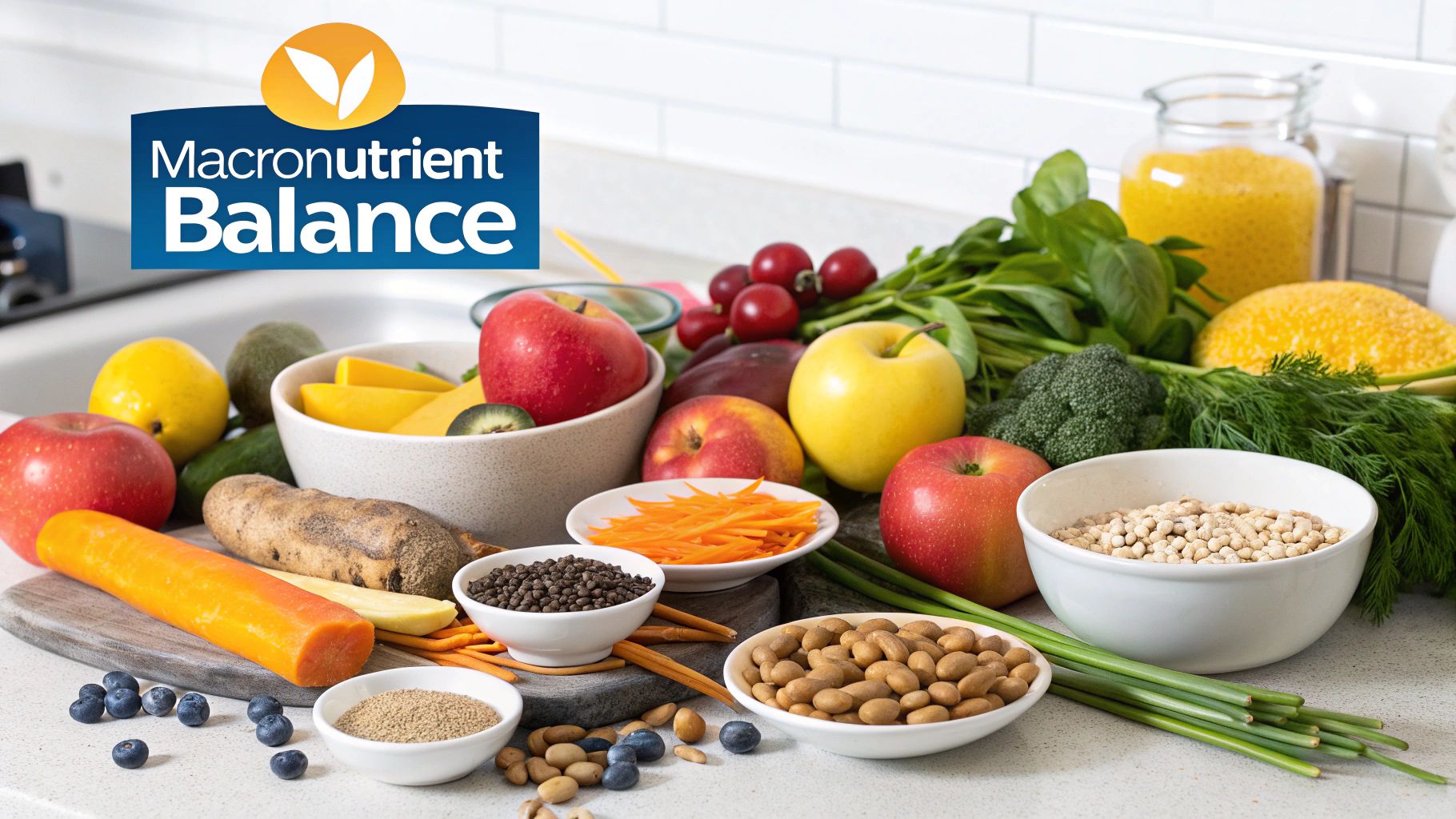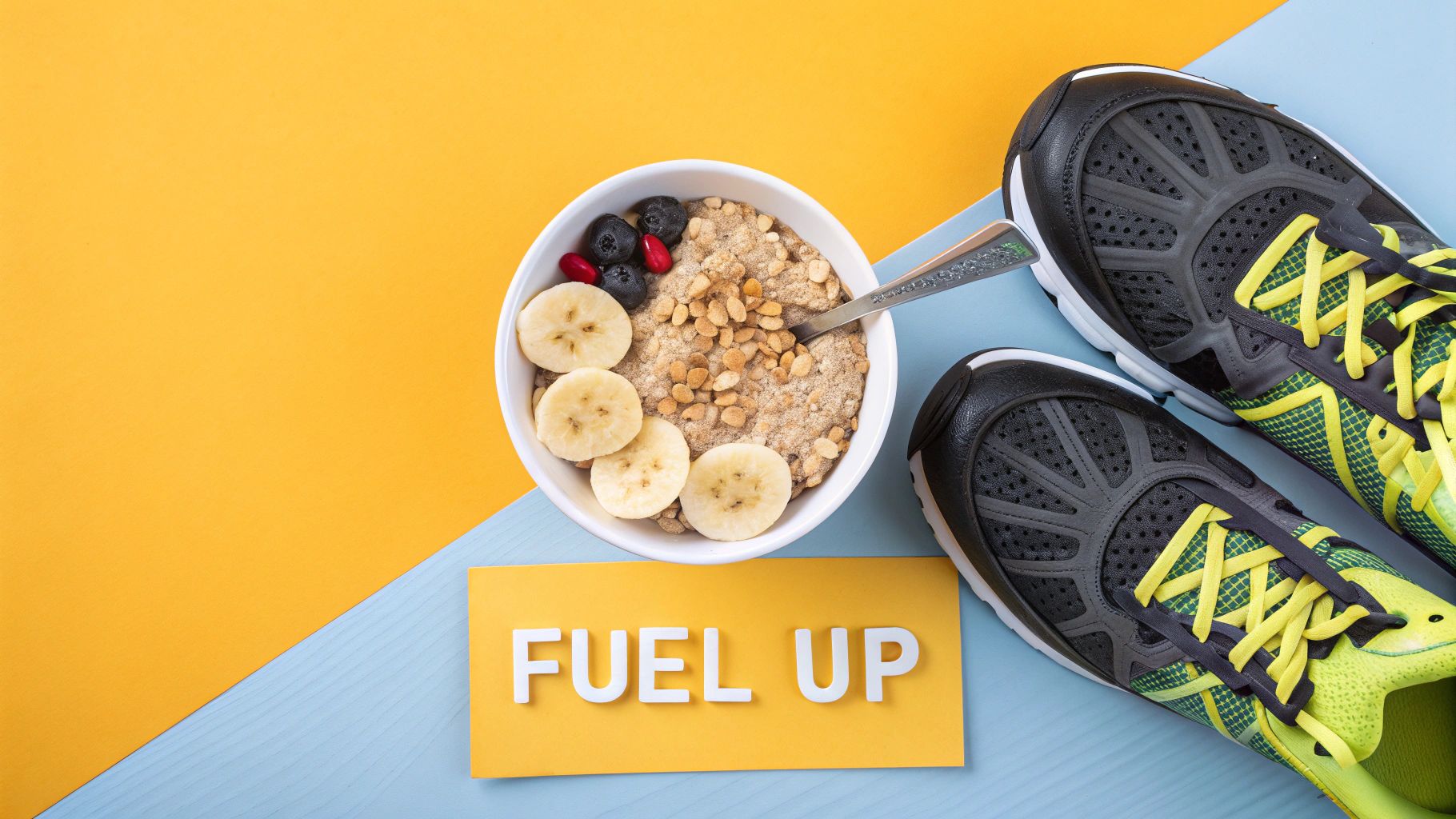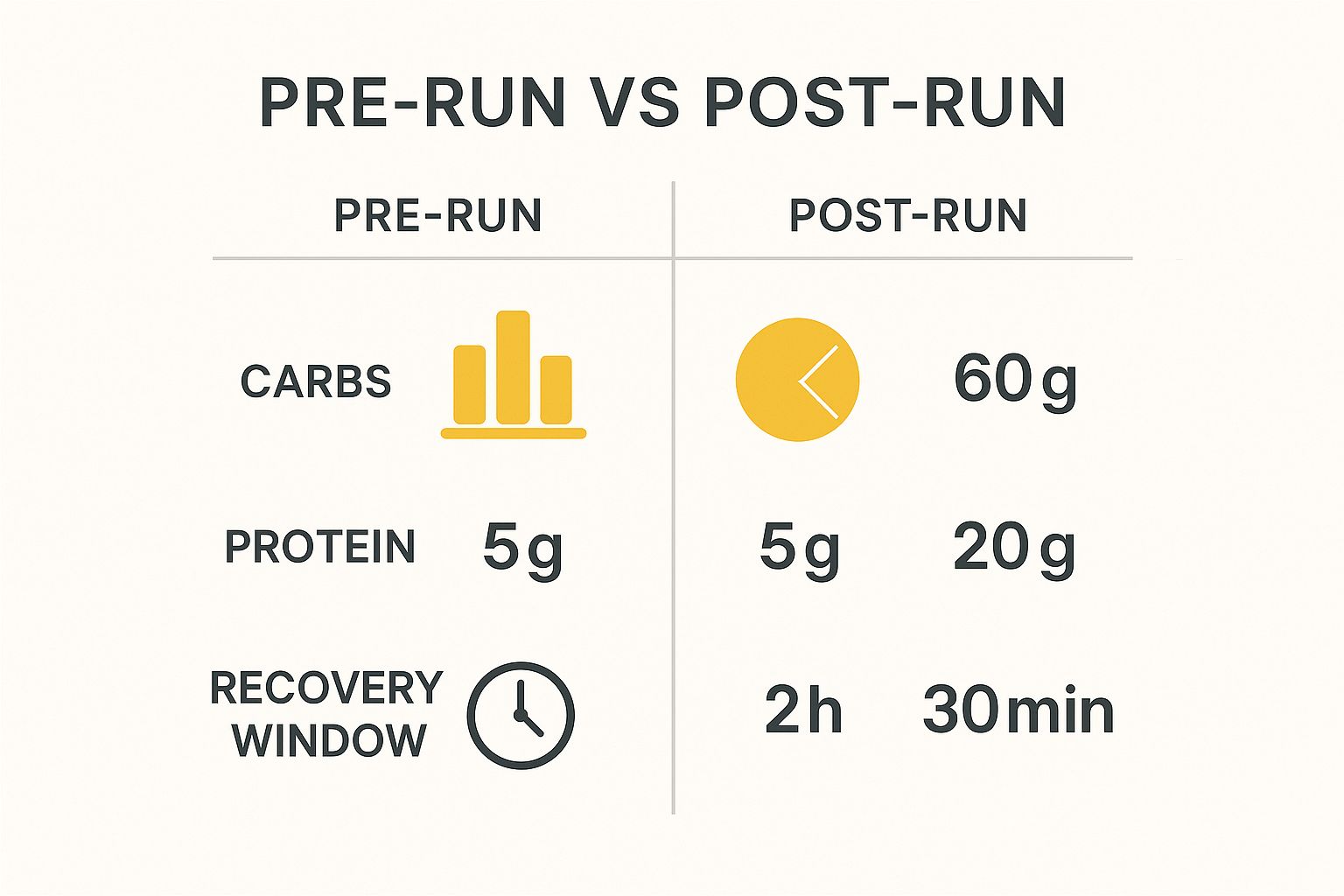Running Nutrition Plan: Top Tips to Boost Your Runs
The Science Behind Effective Runner’s Nutrition
Running, whether a casual jog or a marathon, depends on proper fueling. Your body’s energy needs change based on your run’s intensity and length. Understanding this is key to optimizing your running nutrition plan. A short 5k requires a different approach than a half marathon. Shorter runs use readily available energy, while longer runs need a constant fuel supply.
Fueling for Different Distances
This varying fuel need is clear when comparing a sprint to a marathon. During a sprint, your body uses phosphocreatine and glycogen for quick energy. These stores deplete quickly. In a marathon, your body needs continuous energy from carbohydrates and fats. This highlights the importance of tailoring nutrition to your running goals. You might be interested in: How to master running and weight training .
Macronutrient Balance: The Key to Endurance
The right balance of macronutrients—carbohydrates, proteins, and fats—is essential for runners. Carbohydrates are your body’s preferred fuel, especially during longer runs. They break down into glucose, giving your muscles energy. Protein is vital for muscle repair and growth, aiding recovery after training. Fats provide concentrated energy and support hormone production. Interestingly, running is popular in the UK, with about 40% of the population running weekly as of early 2025, a 4-5% yearly increase. A significant 27% run one to three times a week, highlighting the need for structured nutrition. Learn more about UK running trends .
Timing is Everything
When you eat is as crucial as what you eat. Pre-run fuel gives initial energy for your workout. Mid-run fueling maintains energy during longer efforts. Post-run nutrition replenishes glycogen and promotes muscle recovery. Optimizing nutrition at each stage helps overall performance and recovery.
Pre-Run Fuel: Timing Your Nutrition for Peak Performance

The hours leading up to a run can significantly affect your performance, regardless of your experience level. Whether you’re a seasoned marathoner or just starting out, understanding how to fuel your body properly is essential. This section will explore practical pre-run nutrition strategies specifically for runners in the UK. We’ll cover how to personalize your pre-run meals based on several factors, including workout intensity, time of day, and individual digestive sensitivities.
Understanding Your Body’s Fuel Needs
Different runs require different fuel strategies. A short, easy run relies on readily available energy stored in your muscles. A long run, however, demands more sustained energy release from carbohydrates and fats. This is where a dedicated running nutrition plan comes into play. For more detailed information on training, check out this article on How to master your hybrid training program .
Choosing The Right Foods for Sustained Energy
Food choices significantly impact how you feel during a run. The right foods offer sustained energy and prevent mid-run stomach issues, a common runner’s woe. Easily digestible carbohydrates like bananas, toast with a little jam, or a small bowl of porridge are excellent choices. These provide readily available glucose for quick energy. Adding a small amount of protein can help stabilize blood sugar and prevent energy crashes. Consider Greek yoghurt with berries or a handful of almonds with your banana.
Timing Your Pre-Run Meal
When you eat is just as crucial as what you eat. For a morning run, a light, quickly digestible snack about 30-60 minutes beforehand is usually sufficient. Evening runs offer more flexibility. A larger meal a few hours before, along with a smaller snack closer to your run, is often beneficial. This approach ensures you have ample energy without feeling uncomfortably full.
Pre-Run Nutrition Timing Guide
The table below provides a simplified guide for pre-run nutrition based on run length and intensity. Consider it a starting point, adaptable to individual needs and preferences.
| Time Before Run | Meal Size | Carbohydrate Amount | Recommended Foods | Foods to Avoid |
|---|---|---|---|---|
| 30-60 minutes before a short run (under 1 hour) | Small | 15-30g | Banana, toast with jam, energy bar | High-fibre foods, fatty foods |
| 2-3 hours before a long run (over 1 hour) | Medium | 50-70g | Porridge with fruit and nuts, pasta with tomato sauce, chicken sandwich | Spicy foods, large portions |
| >3 hours before any run | Larger meal | Adjust based on overall daily needs | Balanced meal with carbohydrates, protein, and healthy fats | Anything that causes digestive upset |
By understanding these pre-run nutrition principles and adapting them to your own needs, you can optimize your running performance and enjoy every run to the fullest.
Mid-Run Fueling: Keeping Your Energy Tank Full

Hitting the dreaded “wall” during a run isn’t inevitable. It often comes down to proper nutrition. This section explores how and why mid-run fueling is important, offering practical tips you can use immediately.
Understanding Your Body’s Fuel During Runs
Your body processes fuel differently depending on your run’s intensity and length. For short, easier runs, your body primarily burns glycogen, stored energy in your muscles.
However, on longer runs, especially those over 60-90 minutes, glycogen stores deplete. This requires a consistent fuel supply to maintain performance. A smart mid-run fueling strategy becomes a key part of your running nutrition plan.
The Importance of Carbohydrates
Carbohydrates are the main fuel source for endurance activities like running. They convert into glucose, which powers your muscles. As glycogen decreases during longer runs, supplemental carbohydrates become vital to prevent fatigue and keep your pace steady.
This often means consuming easily digestible carbs like energy gels, chews, or sports drinks. These quickly provide glucose to maintain energy levels.
Mid-Run Fueling Strategies for Different Distances
Fueling strategies change depending on distance. Runs under an hour likely don’t require mid-run fuel. Your pre-run nutrition should be enough.
For runs over an hour, aim for 30-60 grams of carbohydrates hourly. During ultra-marathons or very long training runs, this might increase to 90 grams or more hourly, based on individual needs.
Natural Fueling Alternatives
While convenient, commercial products aren’t the only option. Natural choices can also offer lasting energy. Consider dried fruits (raisins, dates), banana slices, or even a homemade trail mix. Experiment to find what works for you.
The UK sports nutrition market provides many runner-specific products. It’s predicted to grow at a CAGR of 7.3% from 2025 to 2035, driven by increased awareness of nutrition’s impact on performance and recovery. More information on the growing market can be found here . Research even suggests runners might benefit from up to 120 grams of carbohydrates per hour during endurance efforts.
Finding What Works Best for You
Finding your ideal mid-run fueling strategy often takes trial and error. Experiment during training, noticing how your body reacts. Watch for digestive issues, such as cramps or bloating, and adjust your intake or fuel type accordingly. By experimenting and listening to your body, you can create a personalized running nutrition plan that helps you achieve your goals.
Recovery Nutrition: The Window You Can’t Afford To Miss

This infographic illustrates pre-run and post-run nutrition needs. It highlights the different carbohydrate and protein requirements, along with the importance of the recovery window. While pre-run nutrition fuels your run, post-run recovery focuses on a shorter timeframe with distinct macronutrient needs. This underscores the importance of refueling quickly after exercise.
Refueling within 30-60 minutes post-run is vital. During this window, your body efficiently replenishes energy and repairs muscle tissue. Think of your muscles like sponges, ready to absorb nutrients. Missing this opportunity can hinder your progress and increase injury risk. A well-planned running nutrition plan helps ensure you give your body what it needs, when it needs it.
Replenishing Glycogen and Repairing Muscle
Effective post-run nutrition has two main goals: glycogen replenishment and muscle repair. Glycogen, stored carbohydrate energy, depletes during runs, especially longer distances. Replenishing these stores is crucial to prevent fatigue and prepare for your next workout. Carbohydrates play a key role in this process. Running also creates tiny muscle tears. Protein provides the essential building blocks for repair and growth.
The Optimal Carbohydrate-to-Protein Ratio
Experts suggest a 3:1 carbohydrate-to-protein ratio for optimal recovery. This means for every 3 grams of carbs, you consume 1 gram of protein. This balance ensures sufficient glycogen replenishment and supports muscle protein synthesis. Nutrition plans for runners increasingly emphasize this timed approach. Research shows that consuming recovery fuel within 30 minutes post-run maximizes glycogen replenishment and muscle repair.
Aim for approximately 1.2 grams of carbohydrates per kilogram of body weight and 0.4 grams of protein per kilogram post-run, ideally in that 3:1 ratio. Cow’s milk, naturally containing lactose and protein in suitable proportions, provides a convenient option. Flavored soy milk offers a plant-based alternative. These recommendations are especially important after runs exceeding 90 minutes, high-intensity workouts, or if you have another training session planned within 12 hours. Learn more with the UK running nutrition guidelines .
The following table provides a comparison of different recovery options:
Optimal Recovery Foods Comparison This table compares different post-run recovery options based on their nutritional profile and effectiveness.
| Food/Drink | Carb:Protein Ratio | Recovery Benefits | Best For | Practical Tips |
|---|---|---|---|---|
| Cow’s Milk | ~3:1 | Provides carbohydrates and protein in close to ideal ratio for recovery. | Easy Runs, Quick Recovery | Convenient and readily available. |
| Flavored Soy Milk | Varies, check labels to ensure ~3:1 | Plant-based alternative with good carbohydrate and protein source. | Easy Runs, Quick Recovery, Vegans/Lactose Intolerant | Check protein content to match needs. |
| Banana with Nuts | ~3:1 (depending on nut choice) | Provides quick energy and protein for muscle repair. | Easy Runs, Short Runs | Easy to transport and consume. |
| Smoothie (Protein Powder, Fruit, Oats) | Customizable to achieve ~3:1 | Highly adaptable for nutrient timing and preferences. Can include additional nutrients. | Long Runs, Intense Sessions | Requires some preparation. |
| Recovery Shake | Varies, check labels to ensure ~3:1 | Designed for quick nutrient delivery, often including electrolytes. | Long Runs, Intense Sessions | Convenient option, but can be expensive. |
This table demonstrates the importance of considering the carb-to-protein ratio when choosing post-run recovery fuel. The convenience factor also plays a role, especially when time is limited.
Hydration Beyond Water
Finally, rehydration is just as vital as refueling. While water is crucial, replenishing lost electrolytes is equally important. Consider electrolyte drinks or adding a pinch of salt to your recovery meal. This helps maintain fluid balance, preventing dehydration and muscle cramps. Focusing on these key principles will create a recovery strategy that benefits your next run and your overall training progress.
Micronutrients: The Hidden Performance Enhancers

While macronutrients like carbohydrates, proteins, and fats fuel your runs, micronutrients—vitamins and minerals—are the essential supporting players. They ensure your body functions optimally, maximizing your running potential. Overlooking these hidden performance enhancers can significantly impact your results. Let’s explore the key micronutrients that directly influence a runner’s performance.
The Power of Iron and Vitamin D
Iron is crucial for oxygen transport, delivering this vital element throughout your body. This is especially important for energy production during endurance activities like running. Low iron can lead to fatigue, reduced stamina, and diminished performance.
Vitamin D, on the other hand, supports bone health, muscle function, and immune system strength. These are all critical for runners looking to stay healthy and perform at their best. Maintaining adequate levels of both iron and vitamin D is essential for optimizing training and recovery.
Case Studies: Real UK Runners, Real Results
Real-world examples highlight the impact of micronutrients on running performance. One UK runner struggling with persistent fatigue discovered a low iron level. After adjusting her running nutrition plan to include iron-rich foods and consulting with her GP, she saw a noticeable boost in energy and improved race times.
Another runner experiencing recurring stress fractures found relief by increasing their vitamin D intake. This led to improved bone health and more consistent training. These cases demonstrate the tangible benefits of prioritizing micronutrients.
In the UK, managing micronutrients is just as important as focusing on macronutrients for runners. Iron, vital for oxygen transport and energy, is often a key concern. While red meat and eggs are excellent sources of highly bioavailable iron, many UK runners follow plant-based diets.
This requires a focus on maximizing iron absorption, as non-heme iron from plants isn’t absorbed as efficiently. Pairing vitamin C-rich foods with plant-based iron sources can enhance absorption. Dairy provides calcium and phosphorus for bone health, but alternatives like soy products and oily fish are also valuable for UK runners. Learn more about fueling your runs with a UK runner’s diet .
Addressing Nutrient Deficiencies
Identifying potential micronutrient gaps is a crucial step in optimizing your running nutrition plan. This involves understanding the seasonal challenges UK runners face, particularly during winter when sunlight exposure (and natural vitamin D production) is limited. A food-first approach, prioritizing nutrient-rich foods before considering supplements, is generally recommended.
Practical Dietary Strategies
Meeting your micronutrient needs doesn’t require a complete diet overhaul. Focus on making informed food choices. Include iron-rich foods like lentils, spinach, and fortified cereals. Boost vitamin D intake with fatty fish, eggs, and fortified foods. A balanced diet rich in fruits, vegetables, and whole grains forms the foundation of a solid running nutrition plan.
Considerations for Plant-Based Runners
Plant-based runners may face unique challenges in obtaining certain micronutrients. Vitamin B12, primarily found in animal products, is one example. Supplementation may be necessary for vegans. Carefully planned meals and potential B12 supplementation can effectively address these challenges. This ensures plant-based runners can maintain a balanced running nutrition plan while meeting their specific dietary requirements. By focusing on both macro and micronutrients, runners can unlock their full performance potential.
Personalizing Your Running Nutrition Plan
Generic nutrition advice rarely works, especially for runners. What fuels one person for a marathon might leave another feeling sluggish. This section provides frameworks for building a personalized running nutrition plan, tailored to your individual training, goals, and body’s feedback.
Understanding Your Unique Needs
Your running nutrition plan should be as unique as your training program. Factors like weekly mileage, training intensity, race goals, and even gut sensitivity all play a role. For example, a runner training for a 5k has different needs than someone preparing for an ultramarathon. You might be interested in: How to create a personalized training program . Similarly, runners with digestive issues need to carefully consider food choices, especially during long runs.
Adapting Your Nutrition Through Training Phases
Your nutrition needs change as your training progresses. During base building, the focus is on consistent, balanced nutrition to support higher mileage. As you transition to more intense workouts, carbohydrate intake becomes crucial to fuel those hard efforts. As you taper before a key race, you may slightly reduce overall calorie intake while maintaining carbohydrate levels to ensure you’re fully fueled for race day.
Experimenting and Tracking Outcomes
Finding what works best involves experimentation. This means systematically testing different foods and fueling strategies during training runs. You might experiment with different pre-run breakfasts or try various energy gels during long runs. Closely monitor how your body responds. Do certain foods cause digestive distress? Do you feel more energetic with specific fueling strategies? Keeping a training log to track these outcomes is incredibly valuable.
Catering to Dietary Preferences
Whether you’re an omnivore, vegetarian, or vegan, a personalized running nutrition plan can accommodate your preferences. However, some dietary choices may require closer attention to specific nutrients. For example, iodine is an emerging nutrient of concern—especially among those consuming plant-based milks without iodine fortification. Iodine deficiency can lead to metabolic dysfunctions that hinder athletic performance. For vegetarian and vegan runners, it’s particularly important to monitor iron and vitamin B12 status, which are often less abundant in plant-based diets. Despite these considerations, general UK nutrition guidance for runners emphasizes a balanced diet including whole grains, vegetables, meat, fish, and dairy when possible. This ensures comprehensive nutrient intake to support the demands of running and recovery.
Practical Implementation
Implementing a personalized running nutrition plan doesn’t have to be overwhelming. Start by making small, manageable changes. Instead of drastic overhauls, focus on gradually incorporating new foods and strategies. This might involve swapping processed snacks for whole foods or experimenting with different pre-run meal timings. By taking a gradual, personalized approach, you can create a running nutrition plan that truly optimizes your performance and overall well-being.
Troubleshooting Your Running Nutrition Strategy
Even seasoned runners in the UK can hit nutritional roadblocks that impact performance and recovery. Recognizing the signs that your current running nutrition plan needs tweaking is the first step toward improvement. This section will highlight common pitfalls and offer practical solutions to get your nutrition back on track.
Identifying Warning Signs
Sometimes, nutritional shortcomings are obvious, like consistently “hitting the wall” during long runs. Other symptoms are more subtle. Persistent fatigue, trouble sleeping, getting sick more often, or unusually sore muscles can all indicate nutritional inadequacies. If your performance has plateaued or you’re struggling to bounce back between runs, it’s time to re-evaluate your running nutrition plan.
Common Nutrition-Related Problems and Solutions
Several nutritional issues frequently affect runners. One common complaint is mid-run stomach upset, often caused by high-fiber or high-fat foods eaten too close to running. The solution? Choose easily digestible carbohydrates and limit fats and fiber in your pre-run meal. Experiment to find what sits best with you.
Another issue is post-run appetite loss. After a tough workout, some runners find it hard to eat, hindering recovery. Try liquid nutrition, like smoothies or protein shakes, which are easier to consume. Gradually reintroduce solid food as your appetite returns.
Many runners also struggle with recovery meal timing. It’s essential to refuel within 30-60 minutes of finishing your run to replenish glycogen and start muscle repair. Prepare your recovery meal or snack ahead of time so you’re ready to refuel immediately.
Adapting to Increased Training Load
As training intensifies, so should your nutritional intake. During periods of higher mileage or harder workouts, your body demands more fuel, particularly carbohydrates. Failing to increase calorie and carbohydrate intake can lead to under-fueling, impacting performance and recovery. Gradually increase portions and consider adding extra snacks to meet your body’s increased needs. Read also: Functional movement and how it relates to fitness .
Nutrition for Injury Recovery
Injuries present unique nutritional challenges. While rest is paramount for healing, proper nutrition is crucial for tissue repair. Increase protein intake to support muscle rebuilding and maintain adequate calorie intake, even with reduced activity, to prevent muscle loss. Prioritize nutrient-dense foods rich in vitamins and minerals to support overall health and healing.
Hydration Protocols for Different Weather Conditions
Proper hydration is vital, especially in the UK’s unpredictable weather. During hot summer months, fluid loss increases significantly, requiring more fluids and electrolytes. In colder weather, it’s easy to forget about hydration, but it remains essential for performance and recovery. Adjust your hydration strategy based on temperature and humidity, and consider electrolyte drinks to replace lost minerals.
Practical Steps for Improvement
Implementing a running nutrition plan takes a methodical approach. Start by tracking your current food intake for a few days to spot potential gaps or areas for improvement. Then, gradually incorporate the strategies above, one at a time. For example, adjust your pre-run meal or add a recovery shake after your next run. Observe how your body responds and make further adjustments.
Consistency is key. By consistently following a well-planned running nutrition plan, you can improve performance, enhance recovery, and achieve your running goals.
Ready to elevate your running? Kracey, a dynamic training platform, offers personalized Hyrox training plans tailored to your race date, fitness level, and equipment. Check out Kracey today and unlock your full potential!
Table of Contents
- The Science Behind Effective Runner’s Nutrition
- Fueling for Different Distances
- Macronutrient Balance: The Key to Endurance
- Timing is Everything
- Pre-Run Fuel: Timing Your Nutrition for Peak Performance
- Understanding Your Body’s Fuel Needs
- Choosing The Right Foods for Sustained Energy
- Timing Your Pre-Run Meal
- Pre-Run Nutrition Timing Guide
- Mid-Run Fueling: Keeping Your Energy Tank Full
- Understanding Your Body’s Fuel During Runs
- The Importance of Carbohydrates
- Mid-Run Fueling Strategies for Different Distances
- Natural Fueling Alternatives
- Finding What Works Best for You
- Recovery Nutrition: The Window You Can’t Afford To Miss
- Replenishing Glycogen and Repairing Muscle
- The Optimal Carbohydrate-to-Protein Ratio
- Hydration Beyond Water
- Micronutrients: The Hidden Performance Enhancers
- The Power of Iron and Vitamin D
- Case Studies: Real UK Runners, Real Results
- Addressing Nutrient Deficiencies
- Practical Dietary Strategies
- Considerations for Plant-Based Runners
- Personalizing Your Running Nutrition Plan
- Understanding Your Unique Needs
- Adapting Your Nutrition Through Training Phases
- Experimenting and Tracking Outcomes
- Catering to Dietary Preferences
- Practical Implementation
- Troubleshooting Your Running Nutrition Strategy
- Identifying Warning Signs
- Common Nutrition-Related Problems and Solutions
- Adapting to Increased Training Load
- Nutrition for Injury Recovery
- Hydration Protocols for Different Weather Conditions
- Practical Steps for Improvement